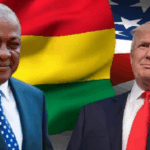
The Ghanaian government’s agreement with the United States to accept West African deportees has ignited a fierce legal, political, and social debate. The controversy deepened after Foreign Affairs Minister Samuel Okudzeto Ablakwa confirmed that an additional 40 deportees are expected—a move critics argue circumvents parliamentary oversight and raises serious national security concerns. The issue highlights a complex interplay of constitutional law, humanitarian principles, economic realities, and human rights.
The constitutional mandate: a legal showdown
At the heart of the matter is whether the Ghana-U.S. agreement requires parliamentary ratification. The Minority, led by Samuel Abu Jinapor, argues that the deal constitutes “a direct violation of the Constitution and an affront to the authority of the Supreme Court” because it was never presented to Parliament. He insists:
“The government and the Minister for Foreign Affairs must lay this agreement before Parliament for scrutiny and ratification, as required under Article 75 of the 1992 Constitution.”
The government, however, maintains that the arrangement is a Memorandum of Understanding (MoU), which, by established convention, does not require parliamentary approval. Minister Ablakwa told Channel One TV:
“If this initial understanding is elevated into a full-blown agreement, we shall not hesitate to comply with Article 75 of the 1992 Constitution by proceeding to Parliament for ratification.”
Humanitarian gesture or political ploy?
The government frames its decision as an act of Pan-African solidarity and humanitarian responsibility. Ablakwa stated:
“We’re not doing the U.S. a favour. We’re doing our fellow Africans a favour; we’re offering them refuge, hope.”
He also emphasised that Ghana received no financial compensation for its role.
However, this narrative has been complicated. Lawyers for the deportees confirmed that at least six of the 11 West Africans flown into Ghana were subsequently transferred to Togo. Of these, only three were Togolese nationals. Lead lawyer Oliver Barker-Vormawor told the BBC this made it impossible for authorities to “bring them before the court or justify their detention.”
The Trump administration’s deportation agenda
The agreement stems from the Trump administration’s hardline immigration policies. Since taking office, the U.S. has pursued an aggressive deportation agenda, often expelling migrants to countries with which they have no strong ties.
The Minority’s Ranking Member on the Foreign Affairs Committee, Samuel Abu Jinapor, warned that Ghana risks becoming a “dumping ground” for migrants rejected by the U.S.:
“We urge the government to provide full clarity on the processes, safeguards, and broader implications associated with receiving these deportees.”
Economic strain and human rights concerns
The deportations have also sparked human rights challenges. Lawyers representing the deportees argue their rights were violated. Barker-Vormawor criticised Ghana’s justice system for failing to intervene, revealing that some deportees were detained in a military camp—illegal, he argued, since they had not broken Ghanaian law.
Some deportees told the Associated Press they were “held in terrible conditions” and not informed of the reasons for their deportation. A U.S. federal judge even questioned the deportations, noting that her “hands were tied” once the migrants were transferred to Ghana.
While the government insists there was no financial benefit, critics warn of potential economic burdens. An Accra resident expressed concern that “Ghana must not become a dumping ground for other countries.” Meanwhile, a Ghanaian living in the U.S. told a diaspora forum:
“I understand the government’s position, but this sets a worrying precedent. What happens if our own people are caught up in this kind of agreement? We need more transparency.”
Diplomatic implications and national identity
The agreement also risks denting Ghana’s international reputation. The Minority has warned that the arrangement could be perceived as aligning Ghana with the Trump administration’s controversial immigration policies.
“While regional integration remains a core value of our foreign policy, it cannot be stretched to justify the forced reception of foreign nationals deported from other countries,” the Minority stressed.
The unfolding legal and political drama will determine not only the future of this agreement but also set a precedent for how Ghana balances constitutional law, humanitarian obligations, and international diplomacy.
